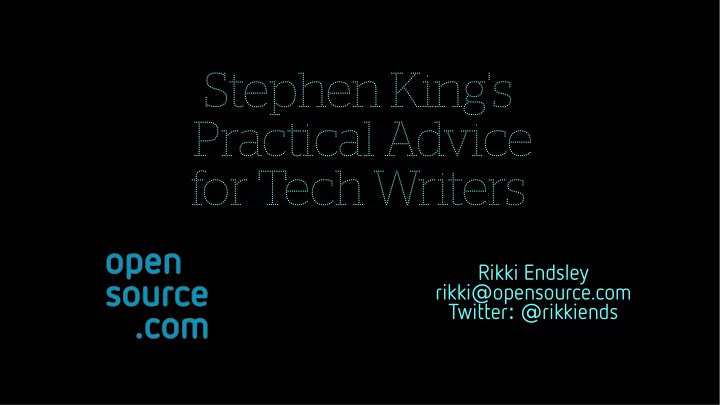

S t e p h e n K i n g ' s P r a c t i c a l A d v i c e f o r T e c h Wr i t e r s Rikki Endsley @ rikki opensource.com : @ Twitter rikkiends
opensource.com/stephen-king
What, Why, Who, How ● What are you writing about ? ● Why are you writing about it ? ? ● Who is your reader ● Will you re-use your content ? ● Research ● Create an outline ● Write ● Revise
Example Whats and Whys let your community know about a bug fjx or security update ● provide a project status update to a manager ● tell developers about a new process for submitting patches ● or to inform the press about the latest software release ●
3 categories of readers ● Lay audience ● Managerial ● Experts @ : Writing CSU Guide : http //bit.ly/1X2deIE
+ The Press The Care and Feeding of the Press : http //netpress.org/care-feeding-press/ Compiled by Esther Schindler, with members of the Internet Press Guild
? RTFM How to write a manual worth reading opensource.com/write-better-docs
? Ready to write Cool your jets. : On Writing A Memoir of the Craft by Stephen King
1. Good writing requires reading If you want to be a writer, you must do two things : ' above all others read a lot and write a lot. There s ' no way around these two things that I m aware of, no shortcut. ~ Stephen King
● Be clear on expectations ● Read examples – See articles on the company blog or publication site – HowTo articles : e.g., How To Writing an Excellent Post-Event Wrap Up Report : opensource.com/write-event-recap by Leslie Hawthorn
Consider how your content might be re-used opensource.com/stephen-king
: Example Writing for expert audience (developers) : Greg DeKoenigsberg, VP Community at Ansible ansible-devel mailing list
: Example Writing for lay audience (community) : Robyn Bergeron, Community Architect at Ansible blog post
2. Invite the reader in An opening line should invite the reader to begin : the story. It should say Listen. Come in here. You want to know about this. ~ Stephen King
3. Tell a story When you write a story, you’re telling yourself the story. When you rewrite, your main job is taking out all the things that are not the story. ~ Stephen King
4. Leave out the boring parts This suggests cutting to speed the pace, and that’s what most of us end up having to do (kill your darlings, kill your darlings, even when it breaks your egocentric little scribbler’s heart, kill your darlings.) ~ Stephen King
● Example 1 : ansible-devel mailing list post omits details about developing modules. Instead, he provides a link to module guidelines.
● Example 2 : community blog post includes background explanation of the problem
After stating the problem, she explains the solution : She links to the boring parts ' (i.e., Greg s post)
: Sample outline news or community announcement ● Introduction (invite the reader in) ● Provide a brief background (state the problem) ● Share the news (explain the solution) ● Conclude (include important dates or action items)
: Sample outline technical article, tutorial, or whitepaper ● Introduction (invite the reader in) ● Provide a brief background (state the problem) ● Share the news (explain the solution) ● Get technical (HowTo steps, FAQ) – Include subheads for longer articles ● Conclude (include important dates or action items)
Facts to include ● What the product is ● When it was fjrst released ● What platforms it runs on ● What the confjguration requirements are ● How much it costs ● Contact people for the press ● URLs and other contact information for the general public From The Care and Feeding of the Press
5. To edit is divine To write is human, to edit is divine. ~ Stephen King
' You ve decided what to write. ' You know who you re writing for. ' You ve done your research. ' You ve sketched an outline. You know how best to edit whatever you write. ' ? What s next
6. Start writing The scariest moment is always just before you start. After that, things can only get better. ~ Stephen King
Write for Opensource.com opensource.com/story @ open opensource.com : Freenode IRC # opensource.com : @ Twitter opensourceway @ rikki opensource.com : @ Twitter rikkiends
Recommend
More recommend